Team GB: How Sam Allardyce revived British football's long-running debate
- Published
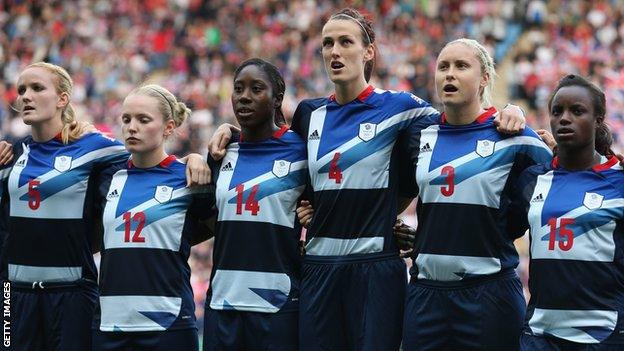
Great Britain's female and male teams exited the 2012 Olympics at the quarter-finals stage
It did not take long for Sam Allardyce to revive one of the most divisive debates in British football's recent history.
Just a month after his appointment as England manager, Allardyce suggested Great Britain should enter football teams at future Olympics.
After a 52-year absence from Olympic football, Great Britain's men had made a controversial return at the 2012 Games in London.
Team GB entered a women's team as well but, with neither at the Rio Olympics this year, Allardyce championed a return for both teams at future Games.
"To turn it down is a great shame. It's something we may look at in the future and try to compete in," he said.
It was not a view shared by his Wales counterpart, Chris Coleman.
"For us, no. I don't agree with that," said Coleman, who led Wales to a first major tournament semi-final at Euro 2016.
"Anything that could put what we've got here, what we've built here, in jeopardy, we would not be for that.
"We've always had a stance that we don't agree with it, and that hasn't changed."
England's Football Association had put forward the idea of sending Great Britain teams to the Olympics, but Fifa said it would need the agreement of the ruling bodies in Scotland, Wales and Northern Ireland, who were against it.
Those three home nations fear such a move could affect their independent status within the sport's world governing body and at international tournaments such as the World Cup.
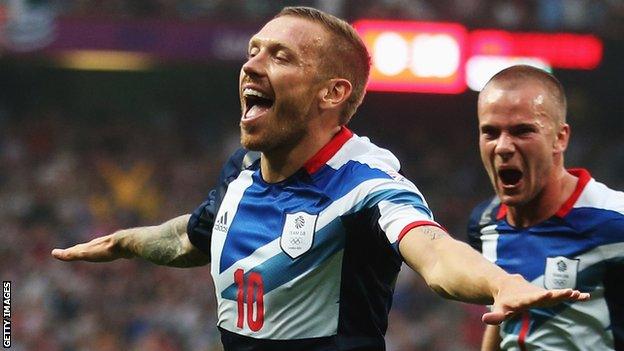
Welshman Craig Bellamy celebrates scoring Team GB's first goal of the 2012 Olympics in the 1-1 draw with Senegal
"I cannot accept we should be a Great Britain team. I think that is wrong. Our independence would possibly go away," former Football Association of Wales (FAW) president Trefor Lloyd Hughes told BBC Wales Sport.
"People say it would not, but be careful. I'm giving the warning that it's a possibility.
"This is my opinion, not the FAW's. I personally will not support Wales joining Team GB at all."
Controversial return
There was a sinking familiarity to the way Team GB's most recent Olympic campaigns ended - both men and women exiting at the quarter-final stage - but it was the fraught nature of Great Britain's return which most will remember about football at London 2012.
Great Britain had been Olympic football regulars until 1960 and, having failed to qualify for the next three Games, they decided not to enter a team.
That was until London was awarded the 2012 Olympics, and the clamour grew - from some parts more than others - for Great Britain to field a team.
The Football Associations of Wales, Scotland and Northern Ireland opposed the idea, fearful a British side could affect their status as independent footballing nations.
In 2009, they suggested England could play on behalf of Great Britain. However, Britain's Fifa vice-president Jim Boyce said non-English players would have the legal right to be considered for Team GB.
There was a compromise of sorts. Welsh, Scottish and Northern Irish associations were still opposed to the idea in principle, but they would not stand in the way of any players selected for Great Britain - under the condition the London Olympics would be a one-off.
Ultimately, the 18-man squad coached by Stuart Pearce included 13 English players, none from Scotland or Northern Ireland, and five from Wales - Neil Taylor, Joe Allen, Aaron Ramsey, Craig Bellamy and Ryan Giggs.
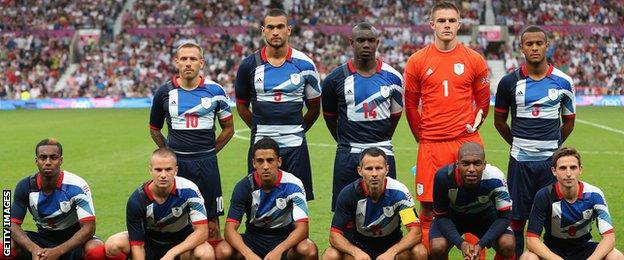
There were four Welshmen in Team GB's first starting line-up of the 2012 Olympics - Craig Bellamy, Neil Taylor, Ryan Giggs and Joe Allen
Could it happen again?
There were no Great Britain football teams - male or female - at the 2016 Rio Olympics.
A place was earned for a women's side thanks to England finishing third in the 2015 World Cup, but again the four national associations could not agree on sending a team to Brazil.
"It's a shame women's football wasn't in the Olympics," Wales manager Jayne Ludlow told BBC Wales Sport.
"The way the game is growing, any event with regards to women's football is one that everybody involved in the women's game should make the most of."
Although keen to see Great Britain field a women's team in the Olympics, Ludlow's endorsement was qualified.
England coach Hope Powell took charge of Team GB for the 2012 Games and named a squad which included 16 English players and two from Scotland but none from Northern Ireland or Wales, whose influential midfielder Jess Fishlock was a surprising omission.
"The thought process with that going forward is the doors are open to discussions but it has to be an environment where it does become a GB team and it doesn't run the way it ran last time," Ludlow added.
"But it ran that way because of people who were in charge at that time. As a Welsh FA we have to do the best thing for Welsh players."
For the men's competition, qualification is via the European Under-21 Championship. England were the only home nation to compete in that tournament, but failed to secure the required semi-final place.
The Scottish Football Association told BBC Wales Sport it remains "opposed to the concept of a Team GB football team", while the Irish Football Association said it "would not be in favour of sending players to a GB Olympic team" and the FAW is still against the idea as well.
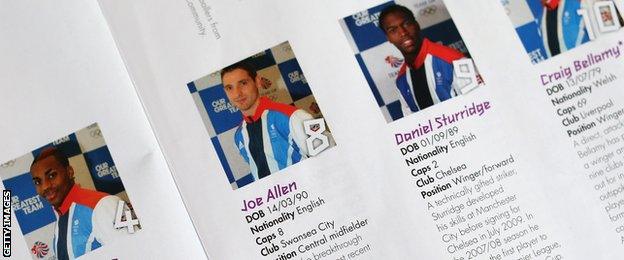
The match programme for Team GB's opening match in 2012 erroneously listed Wales midfielder Joe Allen as being English
The players' perspective
While the Welsh, Scottish and Northern Irish associations oppose the idea, it is understood some would not stand in the way of their players if they were selected for Great Britain.
Selection for the women's team in 2012 proved a sensitive subject, with Scotland's record goalscorer Julie Fleeting ruling herself out of contention for fear of jeopardising the Scottish national team.
For Fishlock, the political impasse is a source of frustration.
"I get why there is no team GB but for women's football in the UK it needs a team GB there's no doubt about that," she told BBC Wales Sport.
"You see the exposure it gets, you see how supportive people are of the Olympics. Do I wish that there was a team GB? Absolutely, I think it's great. It's a once in a lifetime opportunity, it's phenomenal.
"Do I think there will ever be one? No I don't think there will be one ever again. We can keep pushing it and keep pushing it but the only way it's going to change is if governing bodies come out and say it doesn't matter if you have a Team GB, nothing will change with regards to the Euros or the World Cup - but that's not a guarantee.
"The reality of it is if I went to a major tournament I would want to go to play for Wales."
Swansea City's English midfielder Jack Cork, who was in Great Britain's men's squad for London 2012, is also disappointed by Team GB's absence.
"It's sad. We're missing out on a good thing there. It's another big tournament experience Great Britain could get behind and it's a shame we're not involved in that," he said.
"It was amazing. I loved it and I wish they would do it again at future Olympics because it's an unbelievable experience. Especially being in London, it was amazing so I would like to see it back."
- Published14 September 2016
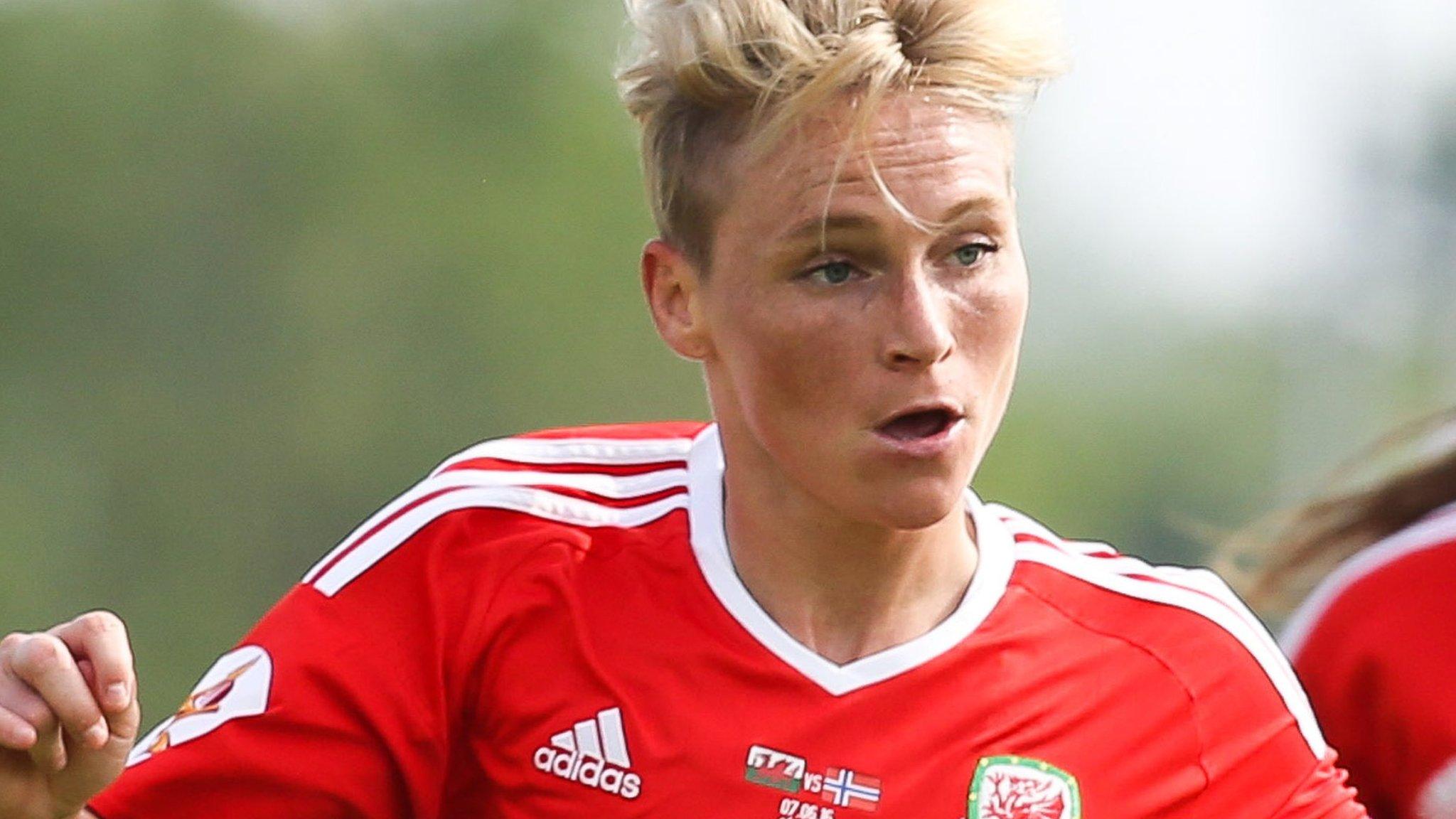
- Published21 August 2016
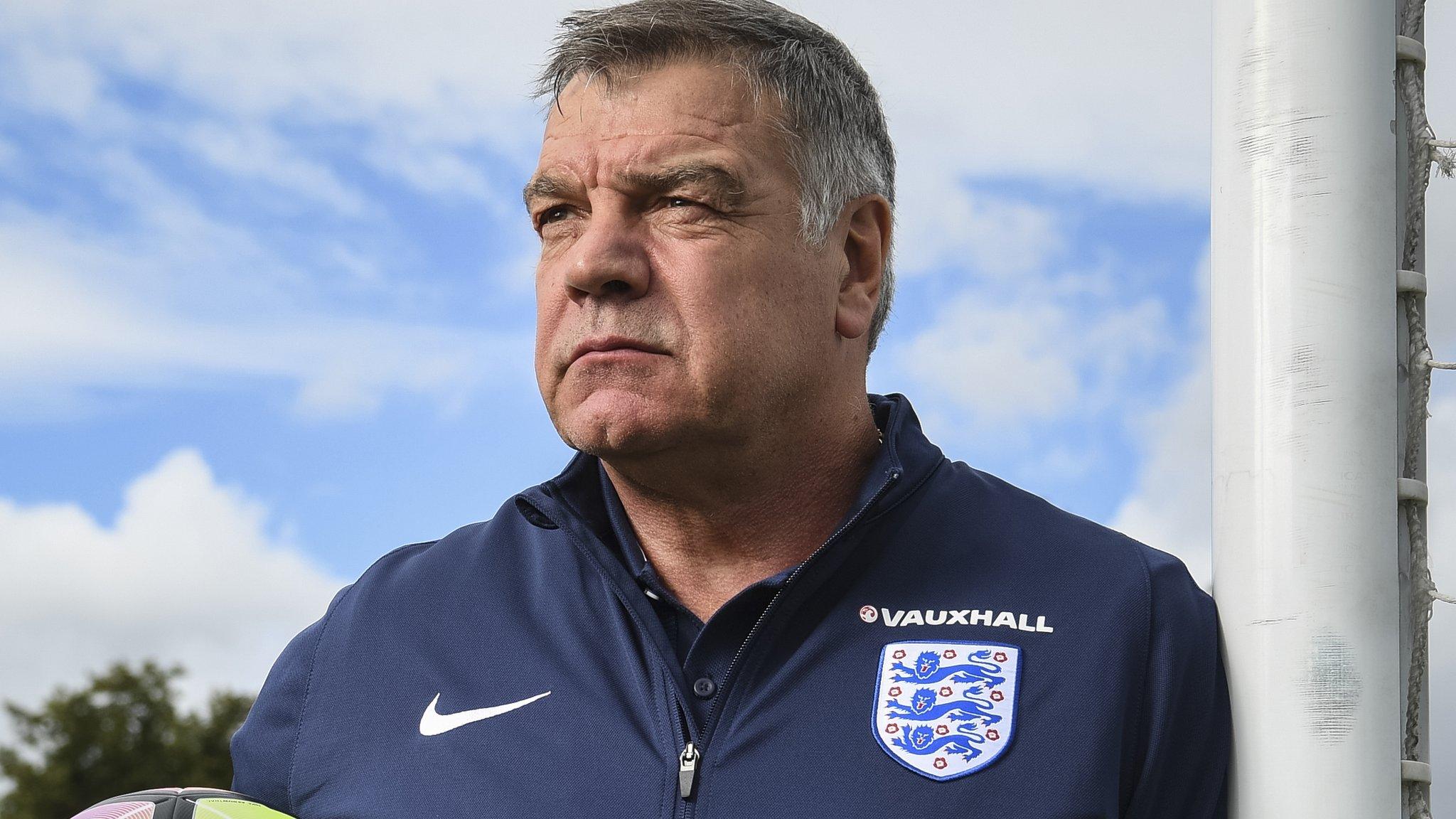
- Published24 August 2016
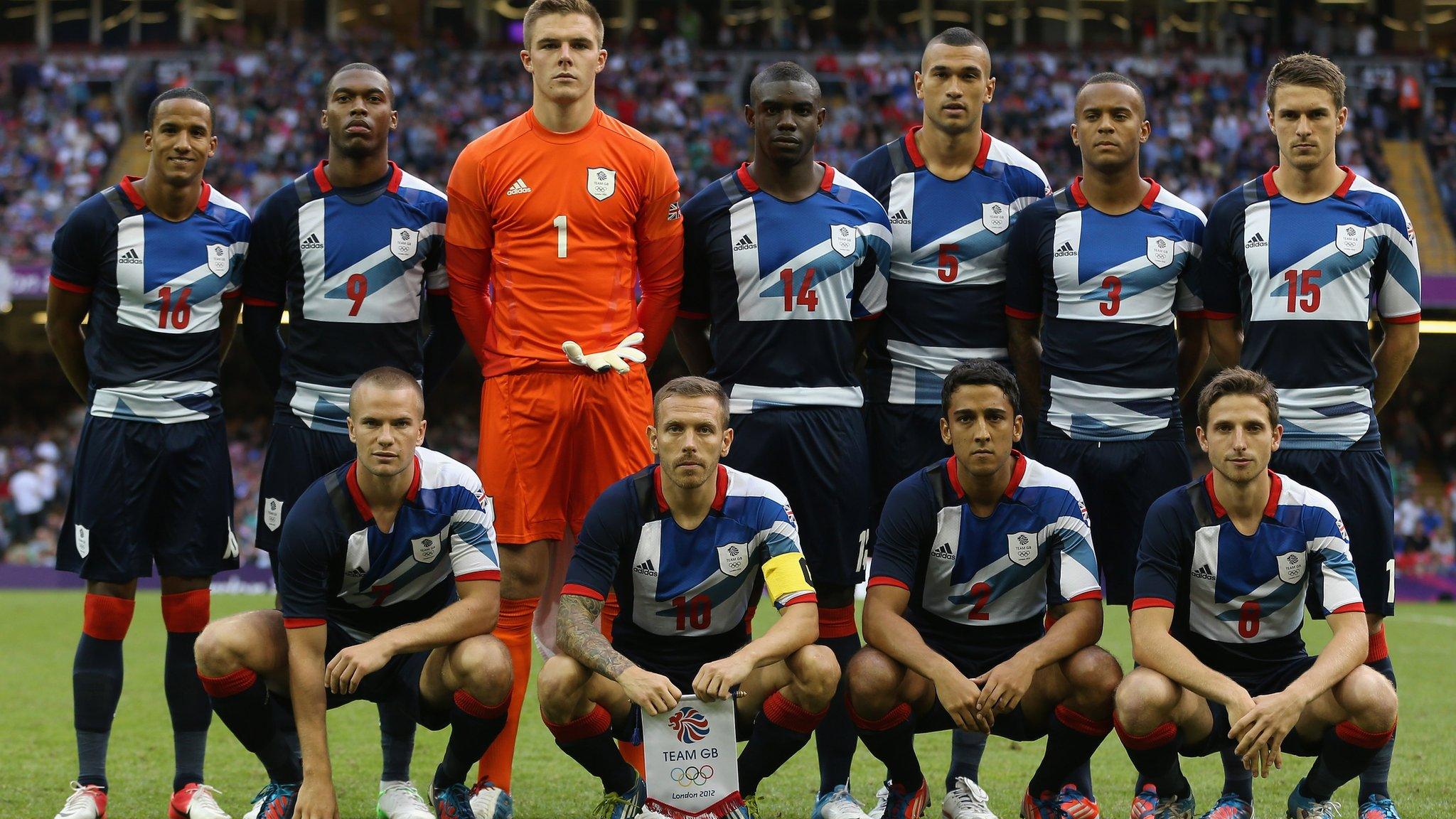
- Published20 June 2016

- Published7 June 2019
